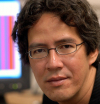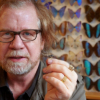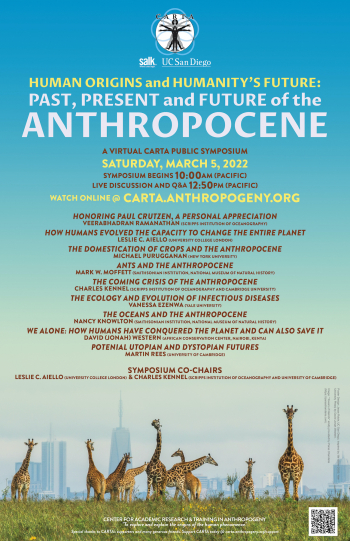Human Origins and Humanity's Future: Past, Present and Future of the Anthropocene
Leslie Aiello, University College London
Charles Kennel, Scripps Institution of Oceanography and University of Cambridge
Summary:
CARTA public symposia typically begin by emphasizing that the primary goal of Anthropogeny is to explore and understand where we humans came from, and how we got here. Consequently, we usually limit discussion of current day implications, and the question of where we are going as a species. This time we will focus on the long and short-term impact of humans on the planet that we inhabit, and the consequences for the future of our species. This also gives us the opportunity to celebrate the memory of the late Paul Crutzen, who coined the term “Anthropocene”. It is relevant to ask how a single species evolved the capacity to completely alter the surface of an entire planet and dominate its governing environmental and ecological processes. This symposium will bring together experts regarding human impact on the planet and also address the current and future implications for our species.
Media for each talk can be played by clicking on icons in the table below, or by clicking on the individual talk titles below and then the attachment file at the bottom of the page.
| Speakers | Media | Session |
|---|---|---|
 Fred Gage  Charles Kennel |
|
Welcome & Opening Remarks |
 Veerabhadran Ramanathan |
|
Honoring Paul Crutzen, A Personal Appreciation I have had the privilege and pleasure of collaborating with Paul for more than 40 years. During the year 2000, when he announced to the world about his Anthropocene concept, Paul and I were in the midst of a major field study on Atmospheric Clouds over the Indian Ocean. He is one of the most creative, innovative and original geo-scientists of his generation. I describe the Anthropocene using the lens of a climate scientist. I conclude with my speculation about how and when we will transition... read more |
 Leslie Aiello |
|
How Humans Evolved the Capacity to Change the Entire Planet The human capacity to change the planet is not something new, but is rooted in our deep evolutionary past. One of the hallmarks of humans is our large brain size, which began to expand about 2 million years ago. This expansion did not come without consequences, and two are particularly important. The first is the additional energy requirements needed to fuel this larger brain size together with the concomitant life history factors such as shorter interbirth intervals, more dependent offspring... read more |
 Michael Purugganan |
|
The Domestication of Crops and the Anthropocene Domesticated species are an interesting group of organisms that have co-evolved with Homo sapiens, and have begun important in human survival and fitness. We trace the origin and spread of these domesticated crop species over the last 12,000 years, discussing both their impacts on human society as well as to the climate and human evolution. We will also present the challenges in modern agriculture and food security. |
 Mark Moffett |
|
Ants and the Anthropocene This talk considers the effects of the most aggressive ants on the environment, arguing that certain invasive species resemble humans in their capacity for global conquest and environmental destructiveness. |
 Charles Kennel |
|
The Coming Crisis of the Anthropocene Connections between past and present human exploitation of the environment, the coming crisis of the Anthropocene and what we humans can do to alleviate the crisis. |
 Vanessa Ezenwa |
|
The Ecology and Evolution of Infectious Diseases Climate change is one of the hallmarks of the Anthropocene. Rising global temperatures are having profound effects on ecosystems and the organisms that inhabit them, including disease-causing organisms such as viruses, bacteria, and parasitic worms. Indeed, the effects of climate change on the distribution and severity of infectious diseases are now widely appreciated. However, much less is known about the potential for infectious agents to contribute to changes in climate. Many infectious... read more |
 Nancy Knowlton |
|
The Oceans and the Anthropocene The ocean is enormous, indeed so large that for centuries we assumed that there was nothing we could do to substantially harm it. Unfortunately, we now know that this is not true. Every year brings new scientific studies and media reports documenting the scale of the damages that the ocean has suffered and grim assessments as to what lies in the future. Less well known, however, are some of the successes we have had in ocean conservation. This is a problem, because bad news without solutions... read more |
 David Western |
|
We Alone: How Humans Have Conquered the Planet and Can Also Save It Conservation is common to all societies which learned to live within ecosystem limits. In breaking the evolutionary and biological straight-jackets constricting other species, we became the ultimate multi-niche free-ranging species. Our rise to global conquest and ecological emancipation from nature through domestication and manufacturing expanded conservation for survival to saving whales, elephants, the Acropolis and Mono Lisa. The universal rules for overcoming a tragedy of the commons... read more |
 Martin Rees |
|
Potential Utopian and Dystopian Futures This century is the first in Earth's history when the catastrophic threats to the entire planet can be induced by one species, humans. We have an ever-heavier collective footprint on the planet. We’re empowered by ever more powerful technologies that can be hugely beneficial, but which if misapplied could trigger calamitous setbacks to civilization. Such events could be global: we’re so interconnected that no continent would be unscathed. It’s an ethical indictment of humanity that the gap... read more |
 All Speakers  Margaret Schoeninger |
|
Question & Answer Session and Closing Remarks |
| Attachment | Size |
|---|---|
| 102.79 KB | |
| 2.36 MB | |
| 144.57 KB |
If you enjoy this event, please consider supporting CARTA's quest to explore and explain the human phenomenon.


